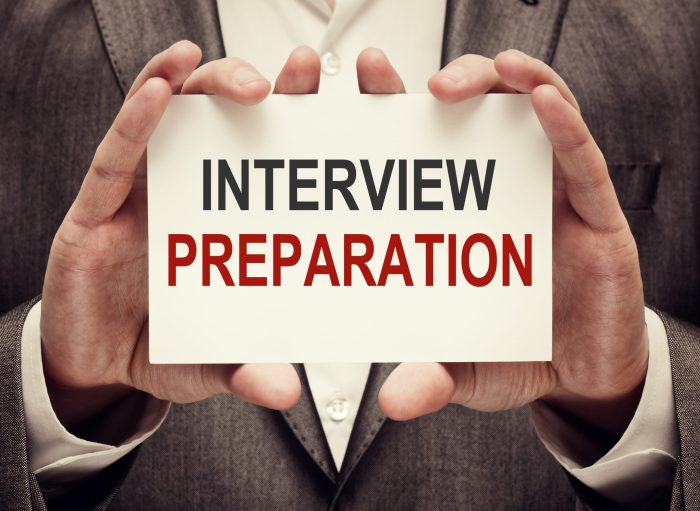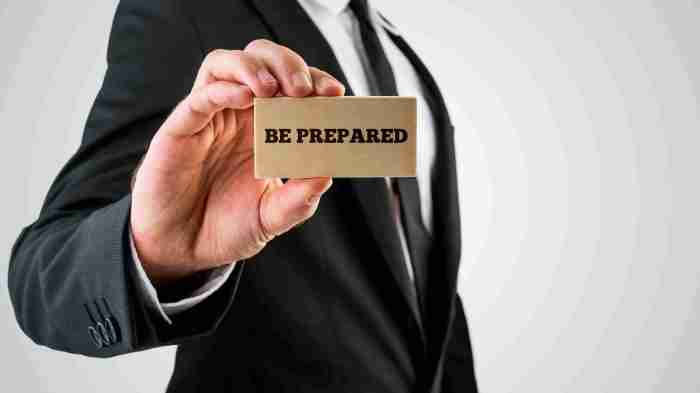Job Interview Preparation sets the stage for success as we dive into the world of acing interviews with finesse and confidence. Get ready for a crash course in landing your dream job like a boss!
From researching companies to mastering common interview questions, we’ve got you covered with all the essential tips and tricks. So, buckle up and let’s get started on this journey to career greatness!
Importance of Job Interview Preparation

Job interview preparation is like studying for a big test, but instead of acing your algebra exam, you’re trying to impress your potential boss and secure that bag, ya know?
Ace the Interview
Proper preparation can take your interview game from 0 to 100 real quick. Here’s how:
- Research the company: Knowing the ins and outs of the company shows you’re serious and invested.
- Practice common interview questions: Ain’t nobody got time to stumble over “Tell me about yourself.”
- Dress to impress: Lookin’ sharp boosts your confidence and shows you mean business.
Benefits of Preparation
Being well-prepared for a job interview ain’t just about landing the gig. Check out these benefits:
- Confidence boost: When you know your stuff, you walk in like you own the place.
- Stand out from the competition: Employers notice when you’ve done your homework.
- Less stress: Prep work means you can relax and let your skills shine during the interview.
Researching the Company
Researching the company before an interview is crucial as it demonstrates your interest and preparation. It allows you to understand the company’s values, culture, products/services, and recent news, which can help you tailor your responses during the interview.
Significance of Researching the Company
- Shows your interest and dedication to the position
- Helps you understand the company’s values and culture
- Allows you to align your skills and experiences with the company’s needs
- Enables you to ask insightful questions during the interview
Methods for Finding Information about the Company
- Visit the company’s official website and read about their mission, vision, and values
- Check the company’s social media profiles for recent updates and news
- Read reviews on websites like Glassdoor to get insights from current and former employees
- Search for recent press releases, articles, or interviews about the company
How Company Research Can Help Tailor Responses During the Interview
- Allows you to mention specific projects or initiatives the company is working on
- Helps you connect your skills and experiences to the company’s needs and goals
- Enables you to ask targeted questions based on your research
- Demonstrates your genuine interest in the company and the role
Understanding Common Interview Questions
When preparing for a job interview, it is crucial to understand common interview questions that may be asked by the interviewer. Being able to effectively answer these questions can significantly increase your chances of landing the job.
Identifying Commonly Asked Interview Questions
- Can you tell me about yourself?
- What are your strengths and weaknesses?
- Why do you want to work for this company?
- Describe a time when you faced a challenge and how you overcame it.
Tips for Answering Behavioral and Situational Questions, Job Interview Preparation
- Use the STAR method (Situation, Task, Action, Result) to structure your responses.
- Be specific and provide examples from past experiences to showcase your skills.
- Focus on how you handled the situation and what you learned from it.
- Avoid giving generic or vague answers; be detailed and concise.
Importance of Practicing Responses to Common Questions
- Practicing your responses to common interview questions can help you feel more confident and prepared.
- It allows you to refine your answers and tailor them to the specific job and company you are interviewing for.
- Rehearsing your responses can also help you identify any areas where you may need to improve or provide more examples.
Dressing for Success

When it comes to job interviews, dressing appropriately plays a crucial role in making a positive impression on your potential employer. Your outfit can communicate professionalism, attention to detail, and respect for the opportunity.
Guidelines for Different Types of Interviews
- For a Corporate Interview: Men should wear a suit and tie, while women can opt for a tailored suit or a conservative dress with a blazer.
- For a Creative Industry Interview: Men can go for smart casual with a button-down shirt and dress pants, while women can choose a stylish blouse with slacks or a skirt.
- For a Startup Interview: Men can wear a polo shirt with chinos or dark jeans, while women can go for a blouse with dress pants or a casual dress.
Creating a Positive First Impression
Remember, dressing professionally is not just about the clothes you wear but also about how you carry yourself. Make sure your outfit is clean, well-fitted, and appropriate for the industry you are interviewing for. This attention to detail can help you stand out and show your potential employer that you are serious about the opportunity.
Body Language and Communication Skills: Job Interview Preparation
In an interview setting, body language plays a crucial role in conveying confidence, professionalism, and interest in the position. It can greatly impact the interviewer’s perception of you as a candidate.
Maintaining Good Posture and Eye Contact
- Stand or sit up straight to demonstrate attentiveness and confidence.
- Make eye contact with the interviewer to show engagement and interest in the conversation.
- Avoid slouching or fidgeting, as it can convey nervousness or lack of confidence.
Effective Verbal Communication Skills
- Speak clearly and confidently, ensuring your voice is audible and easy to understand.
- Avoid using filler words such as “um,” “like,” or “you know,” as they can detract from your message.
- Listen actively to the interviewer and respond thoughtfully to their questions.
Mock Interviews
Mock interviews are a valuable tool in preparing for real job interviews. They offer a chance to practice responses, refine communication skills, and boost confidence in a simulated interview setting.
Benefits of Mock Interviews
- Receive constructive feedback: Mock interviews provide an opportunity to receive feedback on your performance from professionals or peers, helping you identify areas for improvement.
- Practice under pressure: Simulating a real interview experience helps you get comfortable with the format and pressure of being in the hot seat.
- Build confidence: By practicing answers to common questions and scenarios, you can build confidence in your abilities and be better prepared to tackle the real thing.
Tips for Simulating a Real Interview Experience
- Choose a professional setting: Conduct the mock interview in a quiet, distraction-free environment to simulate a real interview setting.
- Dress the part: Dress professionally as you would for an actual interview to get a feel for how you present yourself in a formal setting.
- Research the company: Familiarize yourself with the company and its values to be able to tailor your responses effectively during the mock interview.
Improving Confidence and Performance
- Practice active listening: Engage with the interviewer, maintain eye contact, and listen attentively to demonstrate your communication skills.
- Work on body language: Pay attention to your posture, gestures, and facial expressions to convey confidence and professionalism.
- Review and reflect: After the mock interview, take time to review your performance, identify areas for improvement, and make necessary adjustments for the actual interview.